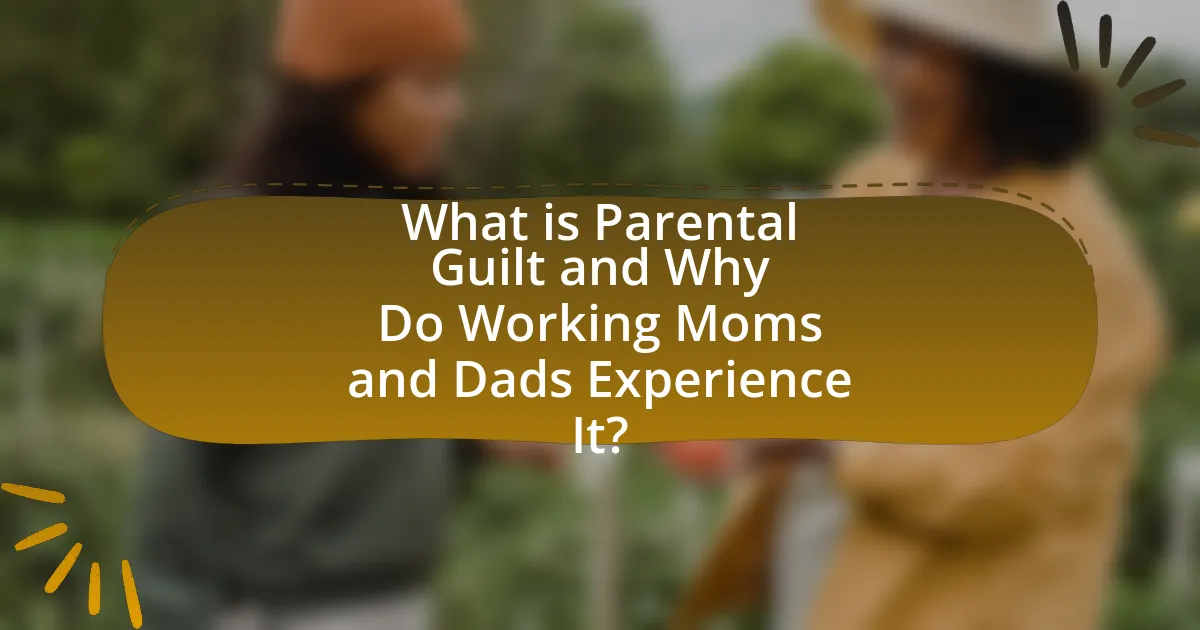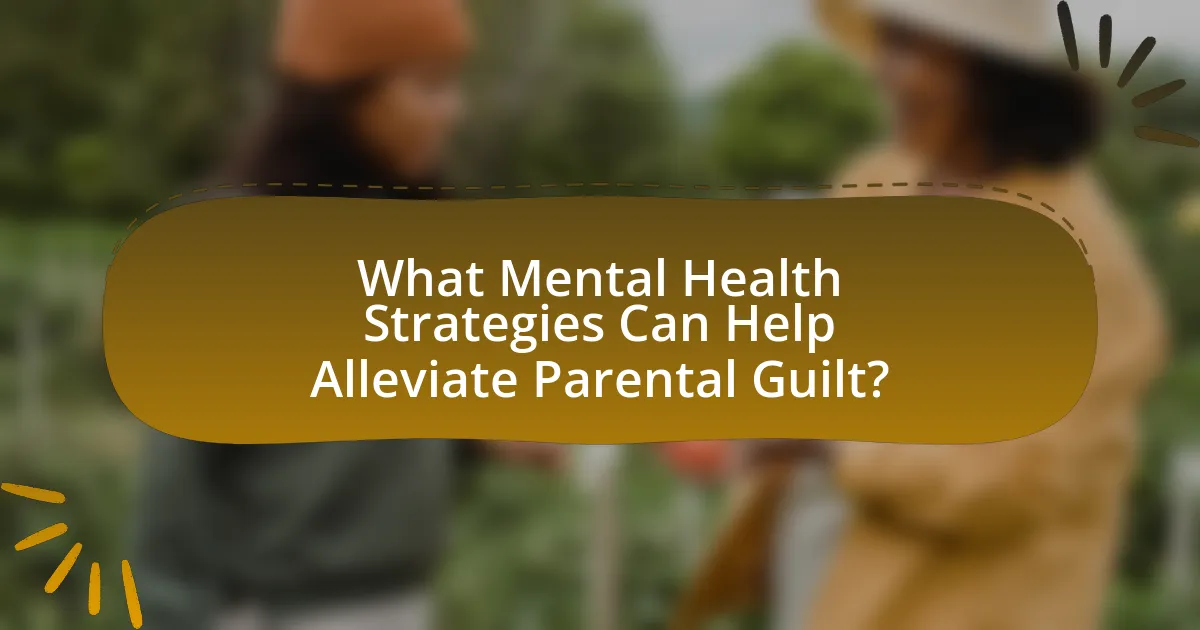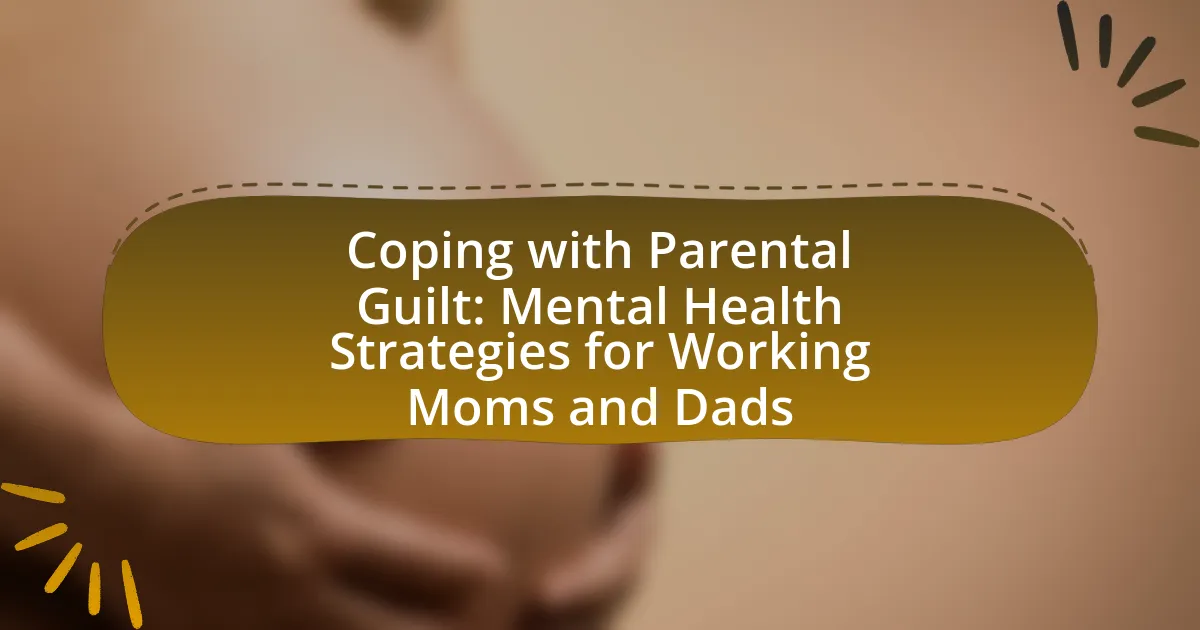Parental guilt is the emotional distress experienced by working moms and dads when they feel they are not adequately meeting their children’s needs due to work commitments. This article explores the factors contributing to parental guilt, including societal expectations, cultural norms, and personal beliefs, while highlighting common triggers and the impact of work-life balance. It also discusses mental health strategies such as mindfulness and self-compassion that can help alleviate these feelings, as well as the importance of building supportive networks and effective communication with partners. By implementing practical tips, working parents can manage their guilt and foster a healthier mindset.

What is Parental Guilt and Why Do Working Moms and Dads Experience It?
Parental guilt is the emotional distress that working moms and dads feel when they believe they are not meeting their children’s needs due to work commitments. This guilt often arises from societal expectations, personal standards, and the struggle to balance professional responsibilities with family life. Research indicates that approximately 70% of working parents report experiencing guilt related to their parenting roles, highlighting the pervasive nature of this issue. Factors contributing to parental guilt include the pressure to excel at work while also being present and engaged at home, leading to feelings of inadequacy and self-doubt among parents.
How does societal expectation contribute to parental guilt?
Societal expectations contribute to parental guilt by imposing unrealistic standards on parents regarding their roles and responsibilities. These expectations often dictate that parents should be perfect caregivers, balancing work and family life seamlessly, which can lead to feelings of inadequacy when they perceive themselves as falling short. Research indicates that 70% of parents report feeling guilty about not spending enough time with their children, highlighting the pressure to conform to societal norms of parenting. This guilt is exacerbated by social media portrayals of idealized family life, which can create a distorted comparison that intensifies feelings of failure among parents.
What role do cultural norms play in shaping parental guilt?
Cultural norms significantly influence parental guilt by establishing expectations regarding parenting roles and behaviors. These norms dictate what is considered “good” or “bad” parenting, leading parents to feel guilt when they perceive themselves as falling short of these societal standards. For instance, in cultures that prioritize intensive parenting, parents may experience heightened guilt if they are unable to devote extensive time and resources to their children, as highlighted in research by Hays (1996) in “The Cultural Contradictions of Motherhood.” This study illustrates how societal pressures can create a sense of inadequacy among parents, reinforcing feelings of guilt when they do not meet these cultural ideals.
How do personal beliefs influence feelings of guilt in parents?
Personal beliefs significantly influence feelings of guilt in parents by shaping their expectations and perceptions of parenting success. For instance, parents who hold strong beliefs about the importance of being present for their children may experience heightened guilt when they are unable to meet these expectations due to work commitments. Research indicates that parents with perfectionistic tendencies often feel more guilt, as they set unattainable standards for themselves, leading to a constant sense of failure when they perceive they fall short. Additionally, cultural and societal beliefs about parenting roles can exacerbate feelings of guilt; for example, mothers may feel guilty for returning to work, driven by the belief that they should prioritize family over career. These beliefs create a framework through which parents evaluate their actions, often leading to feelings of inadequacy and guilt when they believe they are not fulfilling their perceived responsibilities.
What are the common triggers of parental guilt for working parents?
Common triggers of parental guilt for working parents include the feeling of not spending enough quality time with their children, the pressure to balance work and family responsibilities, and societal expectations regarding parenting. Research indicates that 70% of working parents report feeling guilty about their work commitments interfering with family time, highlighting the emotional strain of juggling professional and parental roles. Additionally, the constant comparison to other parents, especially those who are stay-at-home, exacerbates feelings of inadequacy and guilt among working parents.
How does work-life balance impact feelings of guilt?
Work-life balance significantly reduces feelings of guilt among working parents. When parents effectively manage their professional and personal responsibilities, they experience less stress and greater satisfaction in both areas, which diminishes the internal conflict that often leads to guilt. Research indicates that parents who maintain a healthy work-life balance report higher levels of well-being and lower levels of guilt related to their parenting roles, as they feel more present and engaged with their children. This is supported by a study published in the Journal of Family Psychology, which found that parents who prioritize work-life balance are less likely to experience guilt associated with work commitments, leading to improved mental health outcomes.
What specific situations lead to increased parental guilt?
Increased parental guilt often arises from situations where parents feel they are failing to meet their children’s needs or expectations. Specific scenarios include working long hours, which can lead to feelings of neglect; missing important events, such as school performances or sports games, resulting in feelings of inadequacy; and comparing oneself to other parents, which can exacerbate feelings of not being “good enough.” Research indicates that parents who perceive a lack of quality time with their children report higher levels of guilt, as highlighted in studies on parental involvement and emotional well-being.

What Mental Health Strategies Can Help Alleviate Parental Guilt?
Mental health strategies that can help alleviate parental guilt include practicing self-compassion, setting realistic expectations, and engaging in mindfulness techniques. Self-compassion allows parents to treat themselves with kindness during challenging moments, reducing feelings of inadequacy. Research indicates that self-compassion can lead to lower levels of anxiety and depression (Neff, 2003). Setting realistic expectations helps parents understand that perfection is unattainable, which can mitigate guilt associated with unmet standards. Mindfulness techniques, such as meditation and deep breathing, have been shown to reduce stress and improve emotional regulation, further alleviating feelings of guilt (Kabat-Zinn, 1990). These strategies collectively support mental well-being and foster a healthier parenting experience.
How can mindfulness practices reduce feelings of guilt?
Mindfulness practices can reduce feelings of guilt by promoting self-awareness and acceptance of one’s thoughts and emotions. Engaging in mindfulness allows individuals to observe their feelings of guilt without judgment, which can diminish the emotional intensity associated with these feelings. Research indicates that mindfulness meditation can lead to lower levels of anxiety and depression, which are often linked to guilt. A study published in the journal “Mindfulness” by Keng, Smoski, and Robins (2011) found that mindfulness practices enhance emotional regulation, enabling individuals to respond to guilt with compassion rather than self-criticism. This shift in perspective helps to alleviate the burden of guilt, fostering a healthier mental state for working parents.
What mindfulness techniques are most effective for parents?
Mindfulness techniques most effective for parents include mindful breathing, body scan meditation, and mindful observation. Mindful breathing helps parents center themselves and reduce stress by focusing on their breath, which has been shown to lower anxiety levels. Body scan meditation encourages awareness of physical sensations, promoting relaxation and emotional regulation, as supported by research from the University of Massachusetts Medical School, which highlights its effectiveness in reducing stress. Mindful observation involves paying attention to the present moment without judgment, enhancing emotional awareness and connection with children, as noted in studies published in the Journal of Child and Family Studies. These techniques collectively support parents in managing stress and enhancing their mental well-being.
How does mindfulness improve overall mental health for working parents?
Mindfulness improves overall mental health for working parents by reducing stress and enhancing emotional regulation. Research indicates that practicing mindfulness can lead to lower levels of anxiety and depression, which are common among working parents facing the pressures of balancing work and family responsibilities. A study published in the Journal of Occupational Health Psychology found that mindfulness training significantly decreased stress and improved well-being in working adults. By fostering present-moment awareness, mindfulness helps parents manage their thoughts and emotions more effectively, leading to better coping strategies and a more positive outlook on their parenting roles.
What role does self-compassion play in coping with parental guilt?
Self-compassion significantly aids in coping with parental guilt by fostering a kinder and more understanding internal dialogue. This approach allows parents to recognize their imperfections and the commonality of parental struggles, which reduces feelings of isolation and self-criticism. Research indicates that self-compassion is associated with lower levels of guilt and anxiety, as it encourages individuals to treat themselves with the same kindness they would offer a friend in a similar situation. A study published in the Journal of Family Psychology found that parents who practiced self-compassion reported higher levels of emotional well-being and lower levels of guilt, demonstrating its effectiveness as a coping strategy.
How can parents cultivate self-compassion in their daily lives?
Parents can cultivate self-compassion in their daily lives by practicing mindfulness and self-reflection. Engaging in mindfulness allows parents to become aware of their thoughts and feelings without judgment, which is essential for recognizing and accepting their imperfections. Research indicates that mindfulness practices can reduce stress and enhance emotional well-being, as shown in a study published in the Journal of Happiness Studies, which found that individuals who practice mindfulness report higher levels of self-compassion. Additionally, parents can incorporate self-reflective practices, such as journaling about their experiences and feelings, to foster a deeper understanding of their challenges and to acknowledge their efforts. This approach not only promotes self-acceptance but also helps parents to reframe negative thoughts into more compassionate perspectives, ultimately reducing feelings of guilt and enhancing their overall mental health.
What are the benefits of self-compassion for mental health?
Self-compassion significantly benefits mental health by promoting emotional resilience and reducing anxiety and depression. Research indicates that individuals who practice self-compassion experience lower levels of self-criticism and greater emotional regulation, which leads to improved overall well-being. A study published in the Journal of Happiness Studies found that self-compassion is associated with higher life satisfaction and lower levels of psychological distress. This suggests that cultivating self-compassion can be an effective strategy for enhancing mental health, particularly for working parents coping with guilt and stress.

How Can Working Parents Build a Supportive Network to Combat Guilt?
Working parents can build a supportive network to combat guilt by actively engaging with other parents, joining community groups, and utilizing online platforms for connection. Engaging with other parents allows for shared experiences and emotional support, which can alleviate feelings of isolation and guilt. Community groups, such as local parenting organizations or school associations, provide opportunities for networking and resource sharing. Online platforms, including social media groups and forums, enable working parents to connect with others facing similar challenges, fostering a sense of belonging. Research indicates that social support is crucial for mental well-being, as it can reduce stress and improve coping strategies, thereby helping parents manage guilt effectively.
What types of support systems are beneficial for working parents?
Support systems beneficial for working parents include flexible work arrangements, childcare services, and emotional support networks. Flexible work arrangements, such as remote work or adjustable hours, allow parents to balance their professional and personal responsibilities more effectively. Childcare services, including daycare and after-school programs, provide essential care for children, enabling parents to focus on their work without the stress of childcare concerns. Emotional support networks, such as peer groups or counseling services, help parents manage stress and feelings of guilt associated with balancing work and family life. Research indicates that access to these support systems can significantly reduce parental stress and improve overall well-being, as highlighted in studies by the American Psychological Association.
How can peer support groups help alleviate parental guilt?
Peer support groups can alleviate parental guilt by providing a safe space for parents to share their experiences and feelings, which fosters a sense of community and understanding. These groups allow parents to realize that their feelings of guilt are common and shared among others, reducing feelings of isolation. Research indicates that social support can significantly improve mental health outcomes; for instance, a study published in the Journal of Family Psychology found that parents who participated in support groups reported lower levels of stress and guilt. By engaging in open discussions, parents can gain new perspectives, coping strategies, and emotional validation, which collectively contribute to diminishing parental guilt.
What role do family and friends play in providing emotional support?
Family and friends play a crucial role in providing emotional support by offering understanding, empathy, and a sense of belonging. This support system helps individuals cope with stressors, such as parental guilt, by providing a safe space to express feelings and share experiences. Research indicates that social support can significantly reduce feelings of isolation and anxiety, which are common among working parents. For instance, a study published in the Journal of Family Psychology found that strong social networks are linked to better mental health outcomes for parents, highlighting the importance of familial and friendly connections in managing emotional well-being.
How can communication with partners reduce feelings of guilt?
Communication with partners can significantly reduce feelings of guilt by fostering understanding and support. When parents openly discuss their feelings, challenges, and expectations, it creates a shared perspective that alleviates individual burdens. Research indicates that effective communication enhances emotional intimacy, which can lead to decreased feelings of isolation and guilt among parents. For instance, a study published in the Journal of Family Psychology found that couples who engage in regular, honest conversations about parenting stress report lower levels of guilt and increased relationship satisfaction. This collaborative dialogue allows parents to validate each other’s experiences, reinforcing the notion that they are not alone in their struggles, thus mitigating guilt.
What strategies can couples use to support each other in parenting?
Couples can support each other in parenting by establishing open communication, sharing responsibilities, and practicing empathy. Open communication allows partners to express their feelings and concerns about parenting, which can reduce feelings of isolation and guilt. Sharing responsibilities ensures that both partners are actively involved in childcare, which can alleviate stress and promote teamwork. Practicing empathy helps partners understand each other’s perspectives and challenges, fostering a supportive environment. Research indicates that couples who engage in these strategies report higher satisfaction in their relationship and improved mental health outcomes, as they feel more connected and less overwhelmed in their parenting roles.
How does open dialogue about guilt strengthen relationships?
Open dialogue about guilt strengthens relationships by fostering trust and understanding between individuals. When parents openly discuss their feelings of guilt, it allows for emotional vulnerability, which can lead to deeper connections. Research indicates that sharing feelings can reduce stress and promote empathy, as partners can better understand each other’s struggles and support one another. For instance, a study published in the Journal of Family Psychology found that couples who communicate openly about their emotions report higher relationship satisfaction and lower levels of conflict. This open communication creates a supportive environment where both partners feel heard and validated, ultimately enhancing their bond.
What practical tips can working moms and dads implement to manage parental guilt effectively?
Working moms and dads can manage parental guilt effectively by setting realistic expectations, prioritizing quality time, and practicing self-compassion. Setting realistic expectations involves recognizing that perfection is unattainable and that it’s acceptable to not meet every ideal standard of parenting. Prioritizing quality time means focusing on meaningful interactions with children, even if the quantity of time is limited; studies show that quality engagement can significantly enhance parent-child relationships. Practicing self-compassion allows parents to acknowledge their feelings of guilt without judgment, which has been linked to improved emotional well-being.
How can setting realistic expectations help reduce guilt?
Setting realistic expectations can significantly reduce guilt by aligning personal goals with achievable outcomes. When parents set attainable standards for themselves, they are less likely to feel overwhelmed or inadequate, which are common triggers for guilt. Research indicates that unrealistic expectations often lead to feelings of failure and self-criticism, while realistic expectations foster a sense of accomplishment and satisfaction. For instance, a study published in the Journal of Family Psychology found that parents who practiced self-compassion and set realistic goals reported lower levels of guilt and higher overall well-being. Thus, by establishing practical expectations, parents can mitigate feelings of guilt and enhance their mental health.
What daily habits can parents adopt to foster a guilt-free mindset?
Parents can adopt daily habits such as practicing self-compassion, setting realistic expectations, and prioritizing self-care to foster a guilt-free mindset. Self-compassion involves treating oneself with kindness during challenging parenting moments, which research shows can reduce feelings of guilt and enhance emotional well-being. Setting realistic expectations helps parents recognize that perfection is unattainable, thereby alleviating unnecessary guilt associated with unmet standards. Prioritizing self-care, including regular physical activity and mindfulness practices, has been linked to improved mental health outcomes, allowing parents to recharge and approach parenting with a more positive mindset.
